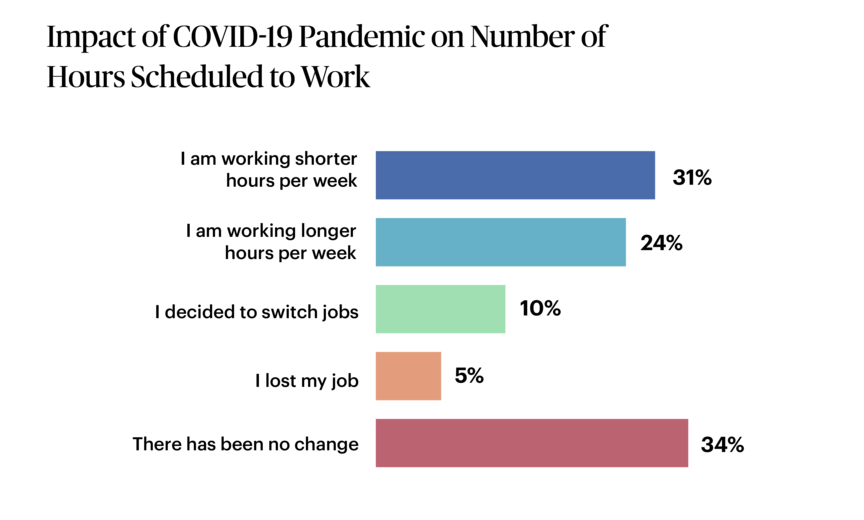- Recursos humanos
- Artículo
- Lectura de 6 minutos
- Last Updated: 04/18/2022
How Unpredictable Work Schedules Are Affecting Employee Well-being

Table of Contents
Since the start of the COVID-19 pandemic, unpredictability has been the norm — especially when it comes to work schedules. Some employees are working longer than expected in a day, others find it hard to clearly separate office and personal hours, while others don’t know which hours or days they’ll be working from one week to the next.
This is particularly important because, according to the U.S. Bureau of Labor Statistics, part-time workers make up about 17% of the employed U.S. workforce. Of those part-time workers, 63% are women.
To find out how schedule instability is affecting employees’ well-being, we conducted an online survey with 605 full-time and part-time employees. The participants were all living in the U.S., working at small to mid-sized businesses (20-500 employees), and aged between 18-74 years old.
In general, the vast majority of employees agree that unpredictable work schedules negatively affect well-being. But there were slight variations depending on working arrangements and generations. Here were some of the top findings:
-
3 in 10 employees currently feel that their work scheduling is unpredictable.
-
More than half of employees had their working hours changed because of COVID-19.
-
85% of employees agree that unpredictable work scheduling negatively affects their overall well-being.
Unpredictable Work Schedules Affect Employees More Than You Think
#1. Unpredictable work scheduling can affect social, financial, and mental well-being
More than half of employees surveyed said their work schedule was changed as a result of the COVID-19 pandemic (only 34% say that things are still the same), and its effects are still felt today.
Currently, 3 in 10 employees still describe their work schedule as being unpredictable. Additionally, the overwhelming response from employees (85%) was that inconsistent work timings negatively influence their daily lives. More specifically, employees reported:
#2. Work schedule unpredictability is affecting younger generations more
Although the general trend has showed that the COVID-19 pandemic affected work schedules for many, there were significant generational differences.
First, more Baby Boomers and Gen Xers reported having "no change" to work hours despite the pandemic compared to Millennials and Gen Z. This may be because older workers have more seniority on the job and more control when it comes to their work schedules.

Conversely, younger generations (Gen Z and Millennials) were more likely to be working longer hours per week because of the pandemic. In line with this, Baby Boomers reported more work schedule predictability than younger generations.
Younger people are also more likely to report an impact on their overall well-being due to scheduling inconsistencies.
Gen X, Millennials, and Gen Z (26%, 29%, and 24%, respectively) were significantly more likely than Baby Boomers (14%) to report struggling to take care of their mental health because of work schedule inconsistency.
The younger generations were also more likely than Baby Boomers to face issues with personal development and family care responsibilities.
However, there were also some commonalities between generations. Struggles with personal commitments and feeling burned out were the top adverse impacts of an unpredictable schedule across all age groups.
#3. Working arrangements can influence schedule predictability
Interestingly, work schedule predictability also seems to be related to working arrangements.
Because of the pandemic:
-
Full-time workers (32%) were significantly more likely than part-time workers (15%) to say that the number of hours they’re working per week has increased.
-
Those working in hybrid work environments (29%) were also more likely to have an increase in hours worked per week than on-site employees (21%).
Because on-site workers are more likely to be customer facing and prone to changes in work hours due to COVID-19, those working entirely on-site (32%) were significantly more likely to say that their work schedule is unpredictable than those in a fully remote (21%) or hybrid (23%) work environment.
The effects of work schedule instability on well-being can also differ based on work arrangements.
On-site (48%) and hybrid (47%) workers were more likely to have difficulty scheduling personal
commitments than fully remote workers (34%). Hybrid workers (26%) were also significantly more likely to feel disconnected from their team/job than on-site workers (17%) and fully remote workers (15%).
Overall, hybrid workers reported the greatest impact of inconsistent scheduling compared to other working arrangements.
#4. Control over work hours can depend on your age and working arrangements
Those who currently work entirely on-site (30%) or in a hybrid (36%) work environment are significantly more likely to say that they can suggest days or hours they want to work than those who work fully remote (19%).
Gen X was also more likely to report that "I don't have any control over my schedule," while Millennials were more likely to say they can "suggest days or hours, but it's not guaranteed," than the other generations.
Of all the generations, Gen Z reported the most flexibility, as 46% reported "I can choose the days or hours I'd like to work."
When asked how employers can better support their schedules, workers responded with sentiments ranging from more flexibility, advance notice of schedule changes, and consistency, to a modification of the number of scheduled hours.
Ways you can optimize work scheduling to help improve employee well-being:
-
Build workplace flexibility into the company culture and recognize the importance of accommodating employees' family and other personal commitments.
-
Focus on building as much predictability into employee work schedules as possible — especially for younger generations and hybrid workers who may be most at risk of inconsistencies.
-
Provide a range of mental health and financial support services. This range can include telehealth for an employee’s and their family’s mental health, financial wellness benefits, and financial literacy education.
-
Lead with empathy so each team leader is aware of the impacts that unpredictable work schedules have on their team members.
“As the great resignation continues to impact workers, especially those in customer facing jobs, employers must take action in understanding the impact unpredictable work schedules have on employees’ well-being and explore the impact that greater predictability will have on employee satisfaction, retention, and productivity.” - Jeanne Meister, EVP, Executive Networks
The Power of Paychex
As the business landscape continues to rapidly evolve, the demands on HR professionals and business owners will only continue to grow. Paychex is here to help. Confidently tackle your current and future HR challenges with the help of our comprehensive human resource solutions.
Tags







